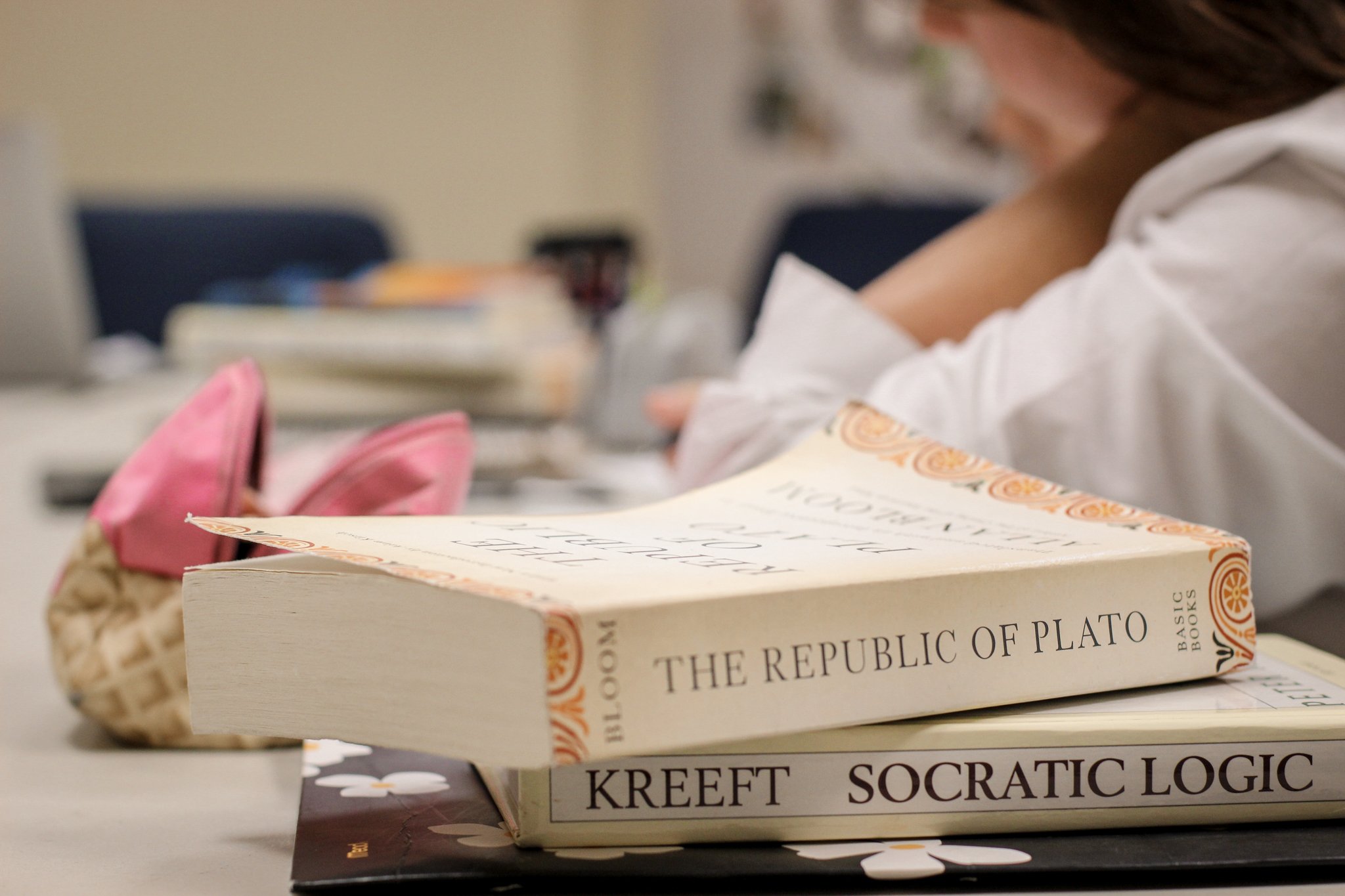
6th-12th Grades
Building Christ’s Kingdom by equipping students to be wise, virtuous, and eloquent lifelong learners through a biblically based and academically excellent education toward the end of knowing and serving our Lord Jesus Christ.
Upper School
The Collegiate Model
We aim to equip lifelong learners. Education isn’t just about cramming for the test; it’s about building habits and disciplines for flourishing across a lifetime. That’s where the collegiate model at LCS comes in!
High School Course of Study
Disciplines with Rotating Content
Theology
Torah, Matthew, Devotional Classics
Acts & Epistles, Luke, Early Church History
Wisdom & Psalms, John, Reformation History
History & Prophets, Mark, Creeds & Confessions
Skill Based Disciplines
Junior High Course of Study
Disciplines with Rotating Content
Skill Based Disciplines
Course Descriptions
-
High School Theology is a four-year rotating course of reading in Bible and theological primary sources. Each year, students study one of the four gospels in depth, along with some aspect of church history, theological thought, or practical Christian living.
Junior High Bible classes primarily focus on deep familiarity with and understanding of the biblical narrative as it reveals the great and gracious drama of redemptive history, along with the basic tenets of the Christian faith.
-
The Trivium Arts are Grammar, Logic, and Rhetoric. These arts of “being at home in a language” are woven throughout the curriculum at LCS, but are particularly applied to the English language in our Trivium Arts of English classes. English Studies include grammar, composition, literary analysis, and poetry study.
Junior High Trivium Arts courses (Parable & Poem, Legends & Laureates, Chronicle & Verse) focus on composition, outlining skills, editing skills, basic grammar and sentence diagramming, beginning literary analysis, and poetry scansion.
High School courses (Poetics & Progym I, II, and III) review and advance all the foundational skills begun in Junior High, then advance students through exercises aimed to meet every composition need that a student may meet; whether academic, vocational, or personal. Composition exercises in each level of Poetics & Progym begin with imitation of classical or literary models, and proceed to application in modern academic essays. Over the course of the three years, students are treated to a leisurely and in-depth study of three foundational literary classics of the Western tradition: Homer’s Odyssey, Virgil’s Aeneid, and Dante’s Divine Comedy, as well as Shakespeare’s Macbeth and a few of Plutarch’s Lives. Our capstone Logic & Rhetoric course includes formal logic and classical rhetoric accompanied by an in-depth study of Plato’s Republic. This course addresses research and writing skills aimed toward winsome and effective persuasion (logos and pathos) with an emphasis on the virtue of the speaker (ethos).
Logic studies for Junior High are skill-based, beginning with Learning & Logic (basic study skills with introduction to informal logic), Logic I (informal logic with an introduction to formal logic), and Logic II (formal logic).
-
These Humanities courses compass the disciplines of history and literature, addressing in context disciplines of philosophy, economics, geography, art, and music appreciation, and more—all aspects that comprise culture, past and present. Grounded in the biblical foundations laid in our Theology courses, students encounter the Great Books, the “best that has been thought and said” in the Western tradition.
We aim to launch students on a lifelong journey with the classic works, of which the Bible is chief.
Arts & Letters is a rotating high school course of reading in literary and historical primary sources, comprising four years: (1) Antiquity; (2) Christendom; (3) American Culture; (4) Modernity.
Western Civ and Intro to Great Books are three-year rotating junior high courses: (1) Ancient Times; (2) Medieval Times; and (3) Modern Times. Students are introduced to the grand sweep of Western civilization from Creation to Modernity. Each year includes one or more selections from the classic Great Books canon, along with a number of “good books” that will aim students toward a lifetime love of learning.
-
Victor Davis Hanson argues, “Four years of high-school Latin would dramatically arrest the decline in American education… Nothing so enriches the vocabulary, so instructs about English grammar and syntax, so creates a discipline of the mind, an elegance of expression, and serves as a gateway to the thinking and values of Western civilization as mastery of a page of Virgil or Livy.” At LCS, we require four years of high school Latin with translation and reading from classical and medieval church authors. The required four years allow ample time for mastery of grammar as well as ability to read in the original texts.
High-school Latin is preceded by Biblical Greek in Junior High. This offers a good introduction to learning a language, reinforces English grammar, and provides deeper understanding of God's Word. Biblical Greek followed by Latin also forms a natural progression as the Greek language preceded and was incorporated into Latin via vocabulary and literary tradition.
The grammatical study of inflected languages like Greek and Latin is unparalleled for disciplining the mind to orderly and logical thinking, which in turn, reinforces all disciplines. Additionally, our methods teach students how to learn a language, so that they are well-prepared for future modern language studies.
-
Plato, in his Republic, positions Mathematics and Geometry as the foundational arts, because they develop students’ “inner vision” and orient their souls toward virtue and intellectual pursuit. These are studies of “timeless truths [that are] beautiful and provide nourishment to the mind,” pointing us to the intricately creative order of our infinitely creative God. Our studies in these arts aim to inspire wonder and love for those timeless truths and that creative order, while cultivating the virtues of humility and gratitude towards the innovators and articulators in the mathematical disciplines, the giants on whose shoulders we stand. Like Latin and music, the mathematical arts discipline the mind to orderly and logical thinking.
Our math progression follows the traditional classical Quadrivium order of Arithmetic and Geometry, followed by algebraic studies (Algebra I, II, and Precalculus). This time-honored ordering respects a student’s cognitive development, with Geometry providing logical, concrete construction of algebraic concepts before the introduction of their abstract expression in formal Algebra studies. Our Algebra courses then provide a great deal of review and practice with applied Geometry.
-
Our studies in Science — Natural Philosophy — aim to develop intellectual curiosity and a sense of wonder inspired by God’s revelation of Himself in the created order, animated by the virtues of gratitude and humility towards the giants of scientific discovery and invention on whose shoulders we stand. We encourage students to take seriously the privilege and duty we have inherited from our first father of both understanding and caring for God’s marvelous creation.
Our curriculum is undergirded by the theological perspective expressed in the LCS Statement of Faith, with a bedrock understanding of God as Creator. Various theories of creationism and evolutionism are addressed so that students will be well-prepared for inevitable encounters with these views in future academic and professional endeavors. Our high school Science courses, Biology, Environmental Stewardship, Physics, and Chemistry, all include a robust lab component with a focus on careful and proper scientific reporting.
Junior High rotating courses in Natural Science are focused on observation and classification in the subject areas of Zoology, Botany, Geology, and Astronomy, as well as introductory topics in Ecology, Physics, Chemistry, and Health. Investigation and experimentation in each area follows the basic trajectory of the historical development of scientific disciplines. These provide a superior foundation from which to approach scientific inquiry and discovery in the high school years.







